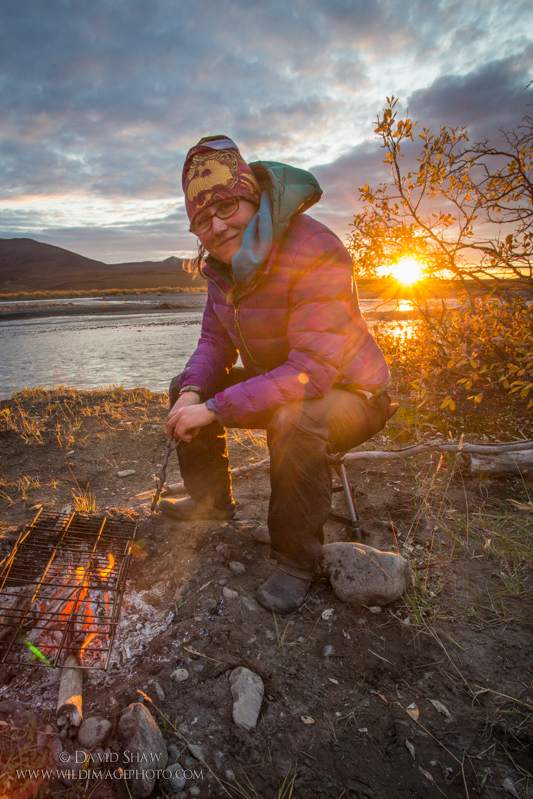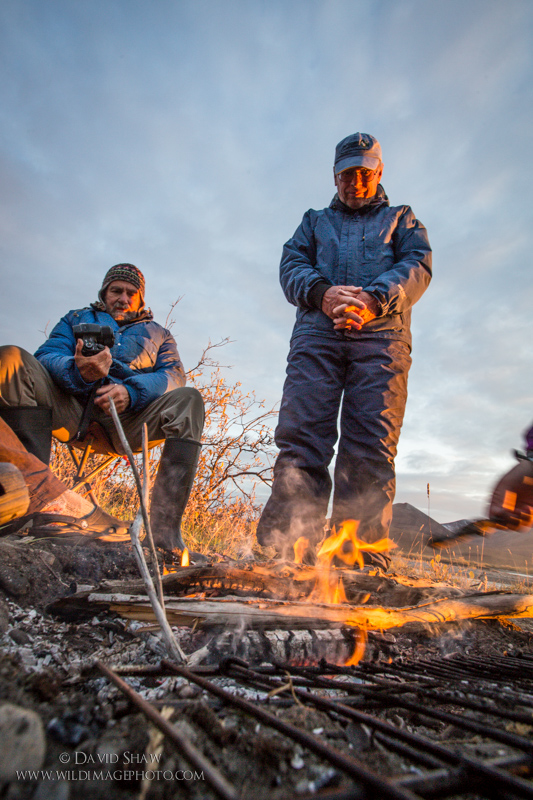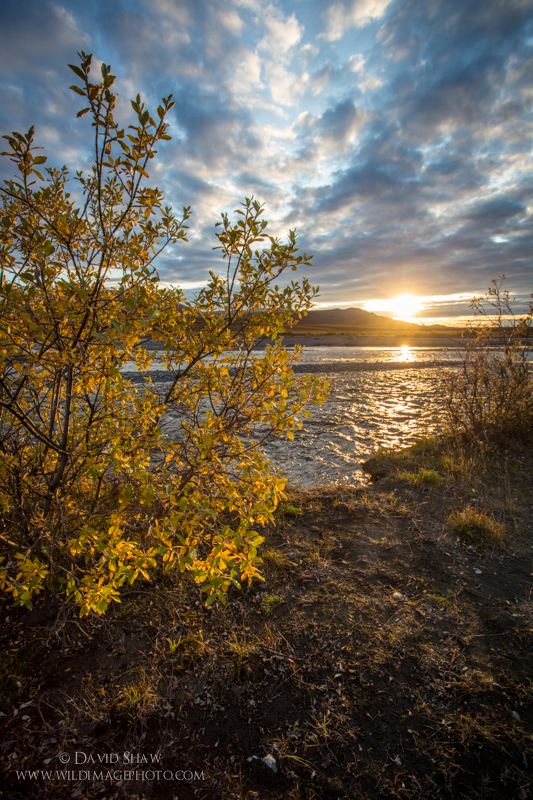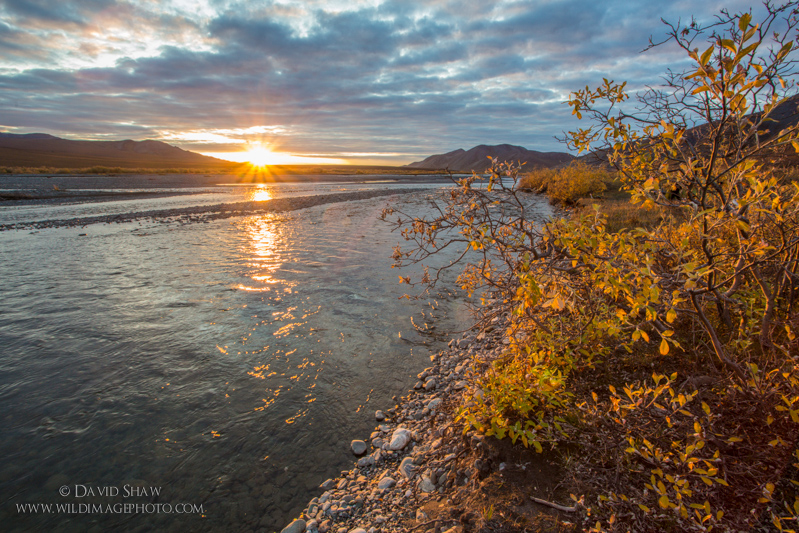“There are strange things done in the midnight sun, by the men who moil for gold…”
So starts the first verse of Robert Service’s classic poem The Cremation of Sam McGee. There is a great story woven into the rhyme and rhythm of that long poem. It’s so good that I’ve memorized the whole damn thing. I look for an opportunity on each of the trips I guide to recite it. This year, I took the opportunity sitting in a tiny tent with four clients in a downpour during a backpacking trip, while watching the evening sun drift over the Jago River, while in the lantern-lit warmth of the historic Slaven’s Roadhouse in the Yukon Charlie Preserve, and while sitting around a campfire beside the Kongakut River as the sun set, and a pair of beautiful Arctic Char were grilled to perfection over the flames.
That final time was the first of September, the final night of my last guiding trip of the season. End of season trips are like walking on a teeter-totter. We toddle along one direction in the sun and warmth, happily ascending the incline of a beautiful late summer. Then, with one wobbly step, our weight crosses the fulcrum and we plunge with stomach-churning suddenness to find the first snows of winter swirling around our tents. Then we turn and rise back into summer, just to feel the drop again.
It’s not a bad thing. Periods of transition are glorious to watch. The autumn foliage rises from the green, and spreads down the mountainsides in a mosaic of orange, magenta, and gold. Some colors appear and disappear in matter of days, others, like the yellows of the willows, will stubbornly cling onto the riverside as the snow line slips down the mountains.
“He was always cold, but that land of gold seemed to hold him like a spell.”

That night beside the campfire, there was a cool wind blowing up the valley from the northwest. The Kongakut, as it reaches the arctic coastal plain, takes a long swing to the west. The valley sweeps through the foothills in a long bend and for the first time during the trip, the landscape yawns open.
In early September the days are still long, but the sun hangs lower in the sky. The evening colors last for hours. The faces of the mountains to the east turned rose with late sun and fall color. While to the northwest, the sky shifted from blues, to pinks, and on to orange and red. Most of my trips in the arctic occur deep in the mountains. Places where the peaks block the sky, leaving little of the sunset visible from our camps along the river. To watch that long sunset was a rarity.
The smoke from the campfire swirled in the breeze forcing all of us, as we hovered close to the warmth, to migrate from one spot to another. The Arctic char, both females, dotted with bright red spots, were steaming, their aroma mixing with the willow smoke.
“The northern lights have seen queer sights, but the queerest they ever did see, was that night on the marge of Lake Lebarge, when I cremated Sam McGee.”

By the time I’d finished repeating the final lines of the poem, the char was ready to consume. I pulled them from the grill, the meat flaking away from the darkened skin. My co-guide and I ladled out soup, quesadillas, and fresh fish onto plates and bowls. The eight of us, clients and guides, tucked in.
The sun was sinking parallel to a ridge to the west, as though it were a ball, rolling down the plank of winter’s teeter-totter. I didn’t know it at the time, but the weight of the sun, was again shifting the balance toward winter.
By the next the morning, snow would again be draping our camp, making our departure later that day a questionable scenario. But that was many hours in the future and we focused our attention instead toward the scene playing out on the horizon.
A few camera shutters snapped, including mine, but mostly we just stood, chatted, and watched. Usually toward the end of a trip, the discussions shift from the place we are to the places we are going to be. We talk about food, and friends, and even things like movies, books, and TV shows. But not that evening. That night along the river, we talked about the rapids we’d passed through, the hikes, and the snow storms. We talked about the peaks we’d climbed, the views we’d seen, the caribou crossing the river, the bear devouring berries on the mountainside above camp. We talked about fishing and the unbelievable number and size of the char that filled the clear water of the river.
We didn’t say much of consequence as the sun went down, eventually disappearing behind some clouds that hung on the western horizon. I don’t remember the words we said but I remember the last of the sun lighting up the golden willow above the blue water of the river. And I remember the taste of freshly cooked fish, and the smell of willow smoke, and the cool arctic breeze.
Sam McGee clung to the north because of precious metals that could be mined. But I prefer the gold of the willows, to the gold of a ring.
Fairbanks writer Dan O’Neil in his beautiful book on the Yukon River “A Land Gone Lonesome”, writes of a similar evening beside a different river:
“The sun is sliding into the north now, and the sky glows with gold. A little breeze makes the river sparkle with white light, flashing like a handful of diamonds scattered across the water. I am a miner too, I’m thinking. This is what I mine.”
Indeed.

Related posts:
Canon 5D III, Canon 24-105 f4L, ISO 50, f14, 1/10th sec, tripod. I've ju...
A few years ago I was traveling in Bolivia. The trip was dedicated larg...
My new ebook on processing digital landscape photographs using Adobe's ...

